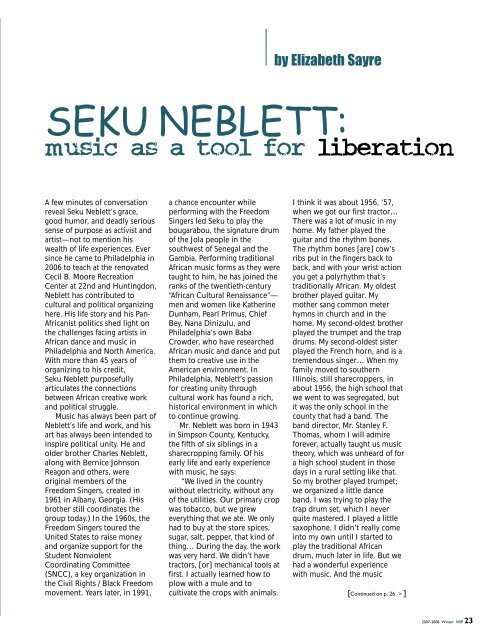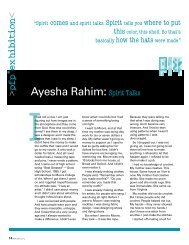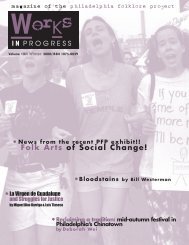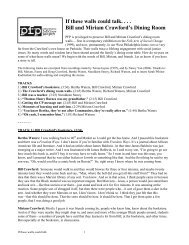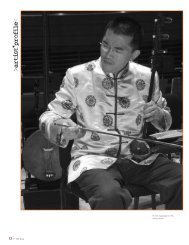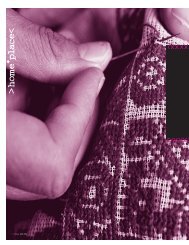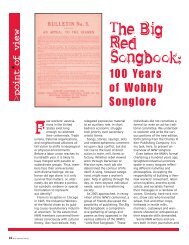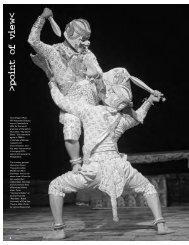African song / Fatu Gayflor ⢠War and wealth - Philadelphia Folklore ...
African song / Fatu Gayflor ⢠War and wealth - Philadelphia Folklore ...
African song / Fatu Gayflor ⢠War and wealth - Philadelphia Folklore ...
You also want an ePaper? Increase the reach of your titles
YUMPU automatically turns print PDFs into web optimized ePapers that Google loves.
y Elizabeth Sayre<br />
SEKU NEBLETT:<br />
music as a tool for liberation<br />
A few minutes of conversation<br />
reveal Seku Neblett’s grace,<br />
good humor, <strong>and</strong> deadly serious<br />
sense of purpose as activist <strong>and</strong><br />
artist—not to mention his<br />
<strong>wealth</strong> of life experiences. Ever<br />
since he came to <strong>Philadelphia</strong> in<br />
2006 to teach at the renovated<br />
Cecil B. Moore Recreation<br />
Center at 22nd <strong>and</strong> Huntingdon,<br />
Neblett has contributed to<br />
cultural <strong>and</strong> political organizing<br />
here. His life story <strong>and</strong> his Pan-<br />
<strong>African</strong>ist politics shed light on<br />
the challenges facing artists in<br />
<strong>African</strong> dance <strong>and</strong> music in<br />
<strong>Philadelphia</strong> <strong>and</strong> North America.<br />
With more than 45 years of<br />
organizing to his credit,<br />
Seku Neblett purposefully<br />
articulates the connections<br />
between <strong>African</strong> creative work<br />
<strong>and</strong> political struggle.<br />
Music has always been part of<br />
Neblett’s life <strong>and</strong> work, <strong>and</strong> his<br />
art has always been intended to<br />
inspire political unity. He <strong>and</strong><br />
older brother Charles Neblett,<br />
along with Bernice Johnson<br />
Reagon <strong>and</strong> others, were<br />
original members of the<br />
Freedom Singers, created in<br />
1961 in Albany, Georgia. (His<br />
brother still coordinates the<br />
group today.) In the 1960s, the<br />
Freedom Singers toured the<br />
United States to raise money<br />
<strong>and</strong> organize support for the<br />
Student Nonviolent<br />
Coordinating Committee<br />
(SNCC), a key organization in<br />
the Civil Rights / Black Freedom<br />
movement. Years later, in 1991,<br />
a chance encounter while<br />
performing with the Freedom<br />
Singers led Seku to play the<br />
bougarabou, the signature drum<br />
of the Jola people in the<br />
southwest of Senegal <strong>and</strong> the<br />
Gambia. Performing traditional<br />
<strong>African</strong> music forms as they were<br />
taught to him, he has joined the<br />
ranks of the twentieth-century<br />
“<strong>African</strong> Cultural Renaissance”—<br />
men <strong>and</strong> women like Katherine<br />
Dunham, Pearl Primus, Chief<br />
Bey, Nana Dinizulu, <strong>and</strong><br />
<strong>Philadelphia</strong>’s own Baba<br />
Crowder, who have researched<br />
<strong>African</strong> music <strong>and</strong> dance <strong>and</strong> put<br />
them to creative use in the<br />
American environment. In<br />
<strong>Philadelphia</strong>, Neblett’s passion<br />
for creating unity through<br />
cultural work has found a rich,<br />
historical environment in which<br />
to continue growing.<br />
Mr. Neblett was born in 1943<br />
in Simpson County, Kentucky,<br />
the fifth of six siblings in a<br />
sharecropping family. Of his<br />
early life <strong>and</strong> early experience<br />
with music, he says:<br />
“We lived in the country<br />
without electricity, without any<br />
of the utilities. Our primary crop<br />
was tobacco, but we grew<br />
everything that we ate. We only<br />
had to buy at the store spices,<br />
sugar, salt, pepper, that kind of<br />
thing… During the day, the work<br />
was very hard. We didn’t have<br />
tractors, [or] mechanical tools at<br />
first. I actually learned how to<br />
plow with a mule <strong>and</strong> to<br />
cultivate the crops with animals.<br />
I think it was about 1956, ‘57,<br />
when we got our first tractor…<br />
There was a lot of music in my<br />
home. My father played the<br />
guitar <strong>and</strong> the rhythm bones.<br />
The rhythm bones [are] cow’s<br />
ribs put in the fingers back to<br />
back, <strong>and</strong> with your wrist action<br />
you get a polyrhythm that’s<br />
traditionally <strong>African</strong>. My oldest<br />
brother played guitar. My<br />
mother sang common meter<br />
hymns in church <strong>and</strong> in the<br />
home. My second-oldest brother<br />
played the trumpet <strong>and</strong> the trap<br />
drums. My second-oldest sister<br />
played the French horn, <strong>and</strong> is a<br />
tremendous singer… When my<br />
family moved to southern<br />
Illinois, still sharecroppers, in<br />
about 1956, the high school that<br />
we went to was segregated, but<br />
it was the only school in the<br />
county that had a b<strong>and</strong>. The<br />
b<strong>and</strong> director, Mr. Stanley F.<br />
Thomas, whom I will admire<br />
forever, actually taught us music<br />
theory, which was unheard of for<br />
a high school student in those<br />
days in a rural setting like that.<br />
So my brother played trumpet;<br />
we organized a little dance<br />
b<strong>and</strong>. I was trying to play the<br />
trap drum set, which I never<br />
quite mastered. I played a little<br />
saxophone. I didn’t really come<br />
into my own until I started to<br />
play the traditional <strong>African</strong><br />
drum, much later in life. But we<br />
had a wonderful experience<br />
with music. And the music<br />
[Continued on p. 26 > ]<br />
2007-2008 Winter WIP 23


